Letter from Japan - How artists experimented with complex online theatre formats during the last one and a half years
Emerging with a Vision
by Tadashi Uchino
August 18, 2021. In Japan, there has never been a lockdown in the sense of the word understood in Europe or in the U.S., simply because there is no such law to allow that to happen. State of emergency was declared twice, on April 7 2020 and January 8th 2021 and the population was asked, not ordered, to stay home.
Artists working in Japan completely stopped doing physical performances at the end of March 2020, although there was no legally mandatory banning of such events. Most of them moved very quickly to work together to ask the government to financially help them, in addition to the more universal aid package the government was preparing. For more talented artists, these self-imposed lockdowns were positively challenging periods to think deeper and work further.
Media-specific performances: Toshiki Okada
Toshiki Okada, for instance, a well-known playwright and director both in Japan and Germany, did some interesting experiments that were media-specific and critically provocative, thinking about the future forms of performance cultures in a wider context.
In February, 2020, Okada was in New York City for the performance of "Eraser Mountain“ at NYU, a work based on the idea of Timothy Morton’s "Ecology without Nature" (2007). He extended this idea after the pandemic into a series of new works, called "Eraser Fields", using Zoom. These are not live but recorded performances, in which we only look into a confined solitary space with participating actors through Zoom and, as no word is spoken, we are invited to “stare” and listen to the noise of their everyday lives.
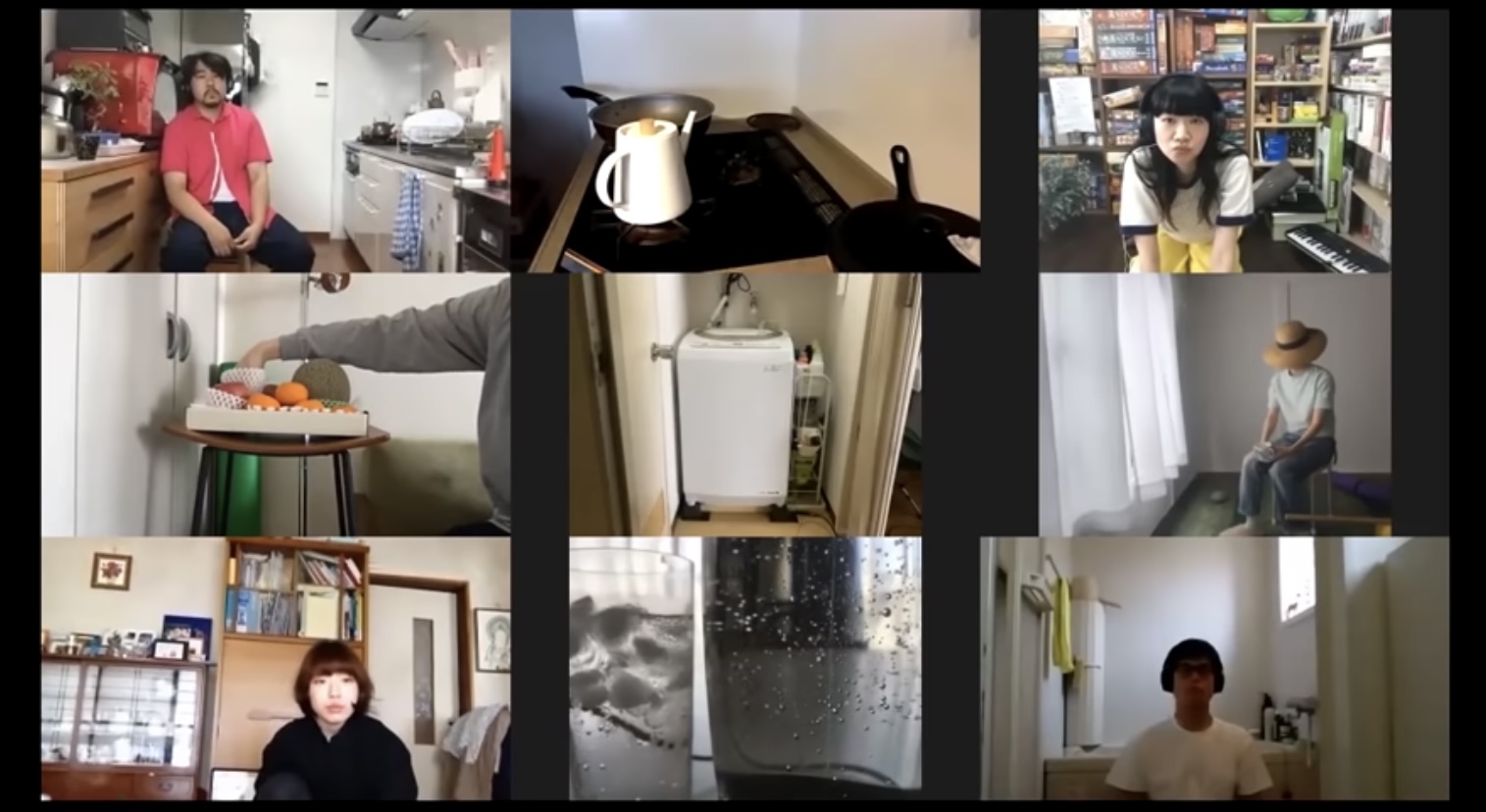 "Earser Field" by Toshiki Okada © Screenshot
"Earser Field" by Toshiki Okada © Screenshot
Okada extended his idea of Zoom theatre in his cancelled work "Ghost and Monster with Unfinished Business", scheduled to open on 3 June 2020 – the work was finally physically performed in June 2021 at Kanagawa Art Theatre in Yokohama. The updated virtual version premiered live on YouTube on 27 and 28 June, 2020. This was a literal desktop theatre, in which the stories of Zaha Hadid and Monju are told. Zaha Hadid is an original architect for the Tokyo Olympics main stadium and Monju is a sodium-cooled fast reactor, which was decommissioned even before it started to operate.
The performance took place in a physical room with a desk, and paper sheets in various forms are put on the desk. The performers and accompanying musicians are projected on those sheets. In fact, every participant is staying in his/her own place; the performance, however, is not separately recorded, but was recorded live using Zoom. It is a desktop, miniature theatre, but there emerged a sense of "theatre as a space" in this YouTube broadcasting format.
Experimenting with form: Satoko Ichihara
For some of the younger generation of artists, the "lockdown" period became a precious time for thinking and experimenting with different forms and media. Satoko Ichihara, a playwright and director, did an interesting revival of her past work in Zoom while Jun Tsutsui, a director, regularly uploaded a series of work only consisting of whispering voices on YouTube, with minimal visual images. There were many others.
Ichihara, in a rather early stage of the pandemic, livestreamed a net version of her "The Question of Faries“ (2017) in real time Zoom twice on 16 and 17 May, 2020. Very well rehearsed, the performance went on quite smoothly with each window being assigned to a single actor. Though not so many of us were accustomed to watching something through multiple “windows” on a computer screen at that time, Ichihara’s monologic style of playwriting fitted the sense of intimate solitude that inevitably accompanies whatever you do using Zoom.
On 18 November, 2020, Ichihara’s play "Underground Fairy“ (2017) was livestreamed in English from New York, directed by Tara Ahmadinejad. Produced by the Japan Society in New York, the livestream was “theatrical” rather than participatory as we all were accustomed to watching theatre work live on screen by then. It was not performed on stage but from different interior locations as to keep the sense of Covid-19 induced sense of confinement and solitude, which, again, fitted Ichihara’s monologic dramaturgy.
Using complex narrative techniques: Suguru Yamamoto
Suguru Yamamoto, a playwright and director of the theater collective Hanchu Yuei, experimented with different forms of Zoom theatre for a while, too, especially asking the question of “what is theatre,” a very typical question, I’m sure, when physical performances are not possible. The major concern for his Zoom theatre was obviously how to keep the sense of theatricality intact even in the digital format, utlizing multiple windows.
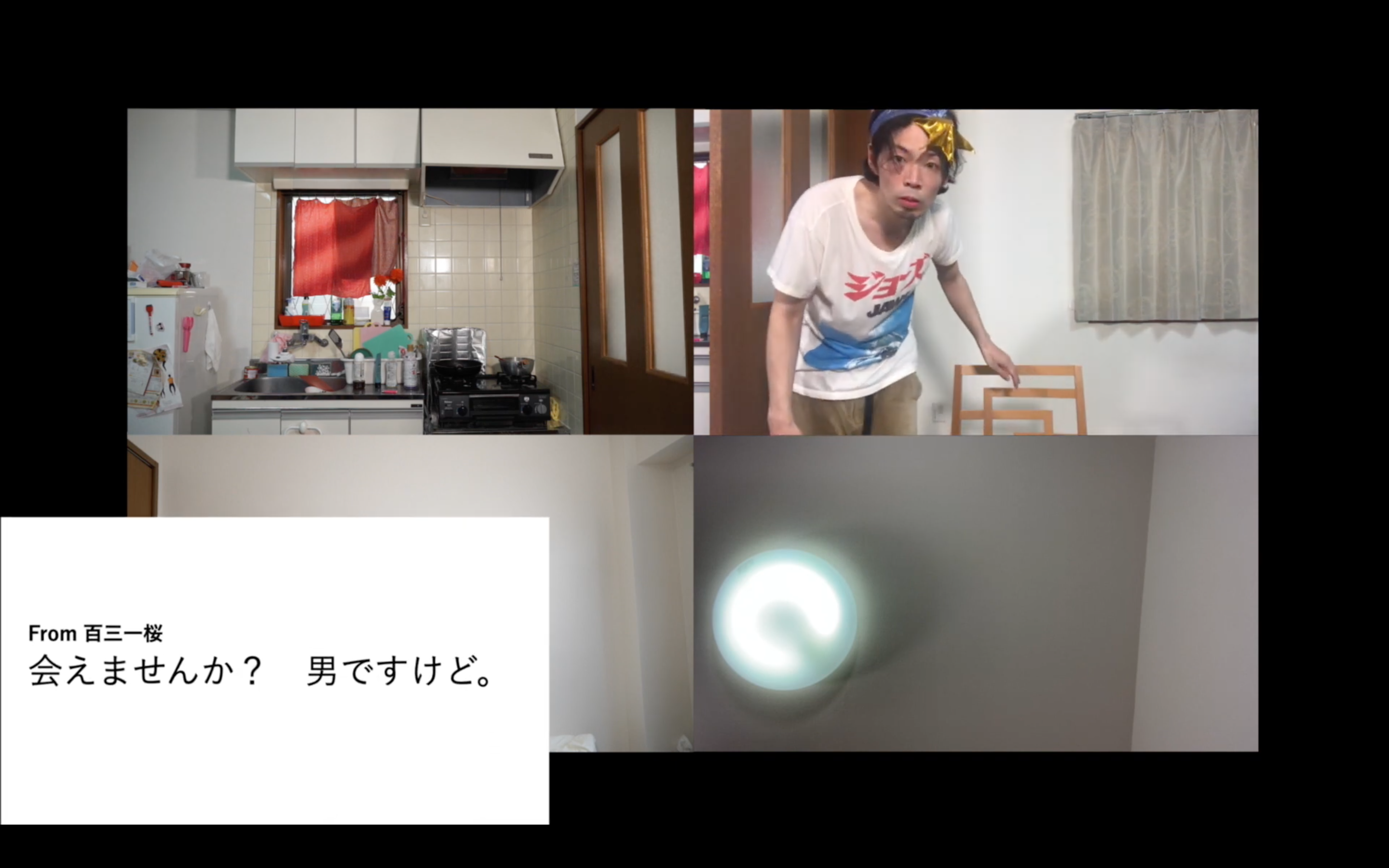 Zoom performance by Suguru Yamamoto © Screenshot
Zoom performance by Suguru Yamamoto © Screenshot
As an emblematic digital native artist, Yamamoto provided different kinds of "performances" via internet, including sound performance and some free-of-charge full recordings of his past performances. He emerged out of this in his latest work "You Can Eat Banna Flowers" with a fully grown theoretical and artistic vision. The performance took place at Tokyo’s Morishita Studios between 25 and 28 March 2021. The performance was recorded with six cameras before the official performance and was delivered digitally for about one month in April 2021.
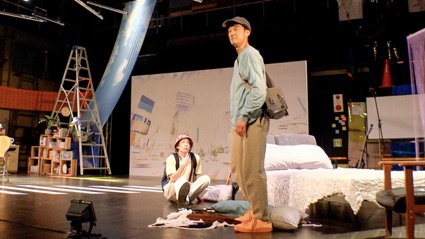 "You Can Eat Banna Flowers" © ScreenshotUsing very complex narrative techniques, "You Can Eat Banna Flowers" tells a seemingly naïve story of contemporary youths. "Seemingly," because the work straightforwardly asks pressing questions about economic disparity, political correctness and, about the “seemingly” out-of-date claim of its protagonist’s project of “saving the world.”
"You Can Eat Banna Flowers" © ScreenshotUsing very complex narrative techniques, "You Can Eat Banna Flowers" tells a seemingly naïve story of contemporary youths. "Seemingly," because the work straightforwardly asks pressing questions about economic disparity, political correctness and, about the “seemingly” out-of-date claim of its protagonist’s project of “saving the world.”
Watching the work, I was sincerely impressed with the powerful creativity of emerging digital native theatre artists like Yamamoto. Their art will definitely survive the pandemic, as they have so much that they want to express and share. This is only possible via a very traditional and analogue form of theatre.
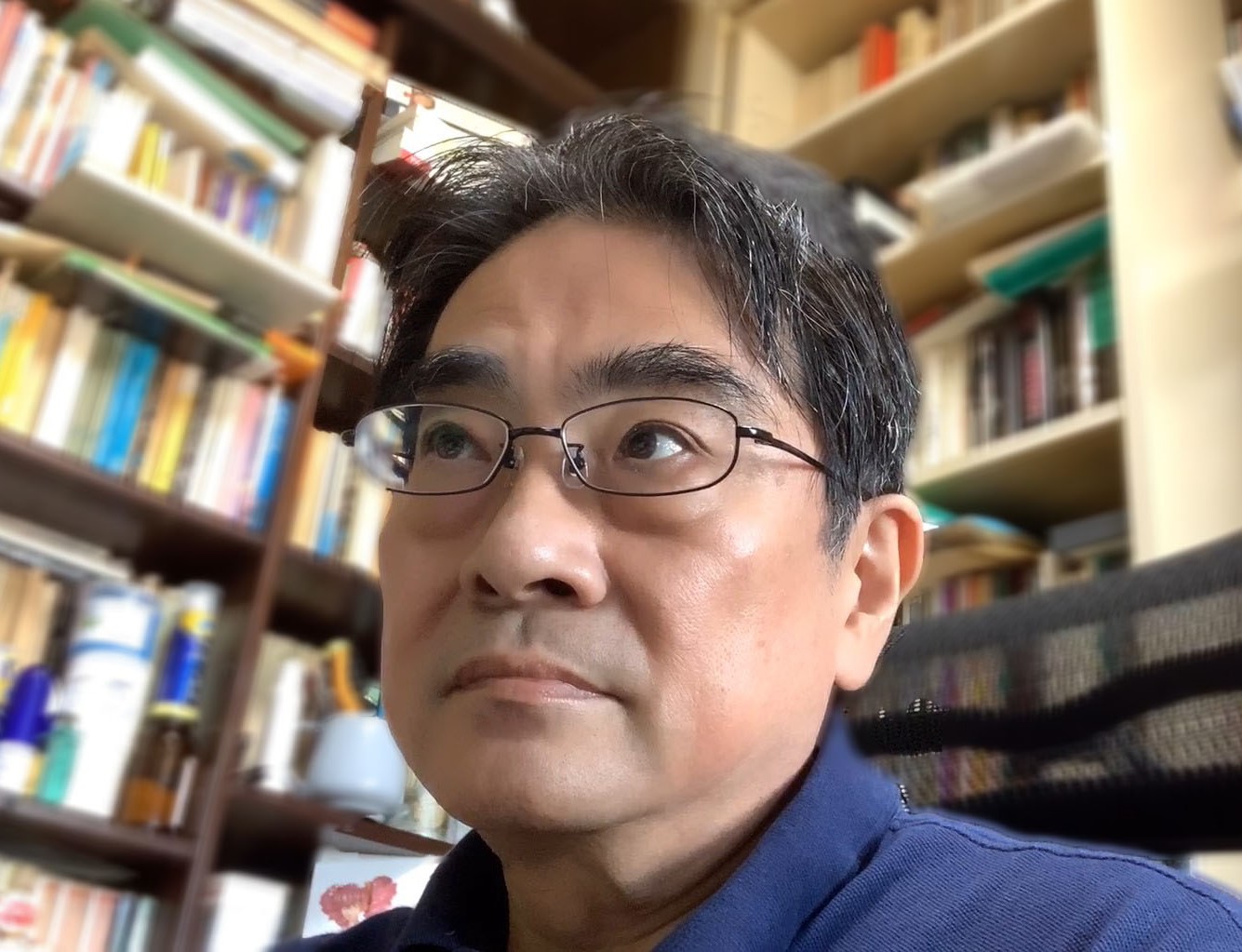 Tadashi Uchino is professor emeritus of the University of Tokyo, and currently is vice president of Gakushuin Women’s College in Tokyo. Uchino is a performance studies scholar and is a contributing editor for The Drama Review.
Tadashi Uchino is professor emeritus of the University of Tokyo, and currently is vice president of Gakushuin Women’s College in Tokyo. Uchino is a performance studies scholar and is a contributing editor for The Drama Review.
This article is part of a cooperation between the International Research College "Interweaving Performance Cultures" at Freie Universität Berlin (editors: Clara Molau, Antonija Cvitic) and nachtkritik.de (editor: Elena Philipp).
So far, Letters from Argentina, Chile, Egypt, Uruguay (German only), South Africa, and Turkey (German only) have been published as part of the series.
A cooperation with
![]()
Für Horizonterweiterung
Der Blick über den eigenen Tellerrand hinaus ist uns wichtig. Wir möchten auch in Zukunft über relevante Entwicklungen und Ereignisse in anderen Ländern schreiben. Unterstützen Sie unsere internationale Theaterberichterstattung.
meldungen >
- 17. April 2024 Autor und Regisseur René Pollesch in Berlin beigesetzt
- 17. April 2024 London: Die Sieger der Olivier Awards 2024
- 17. April 2024 Dresden: Mäzen Bernhard von Loeffelholz verstorben
- 15. April 2024 Würzburg: Intendant Markus Trabusch geht
- 15. April 2024 Französischer Kulturorden für Elfriede Jelinek
- 13. April 2024 Braunschweig: LOT-Theater stellt Betrieb ein
- 13. April 2024 Theater Hagen: Neuer Intendant ernannt
- 12. April 2024 Landesbühnentage 2024 erstmals dezentral




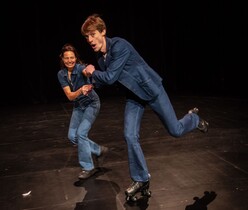



neueste kommentare >